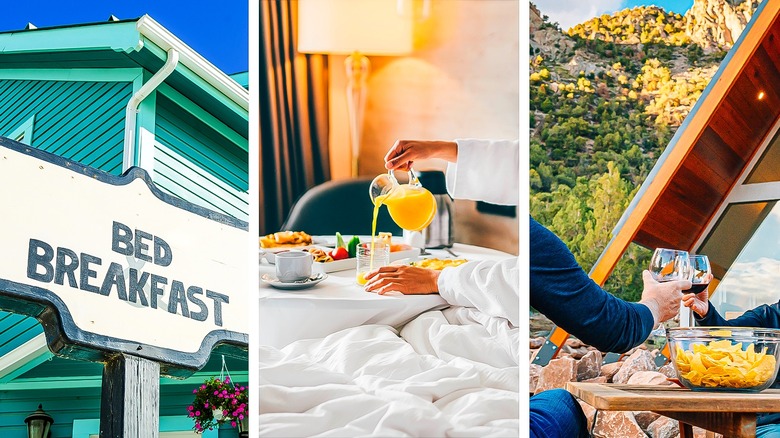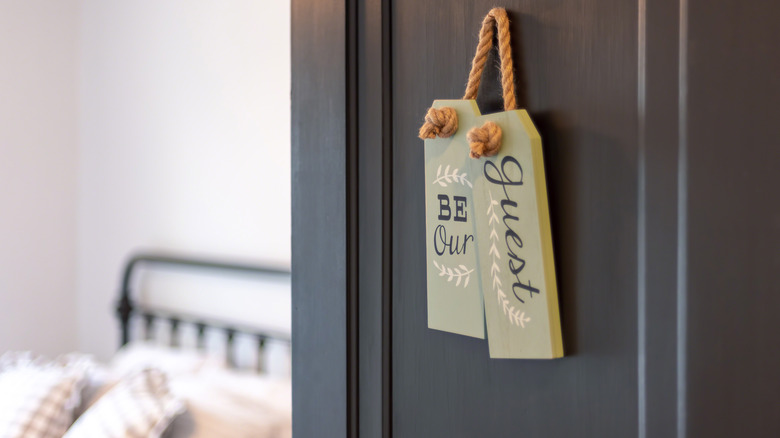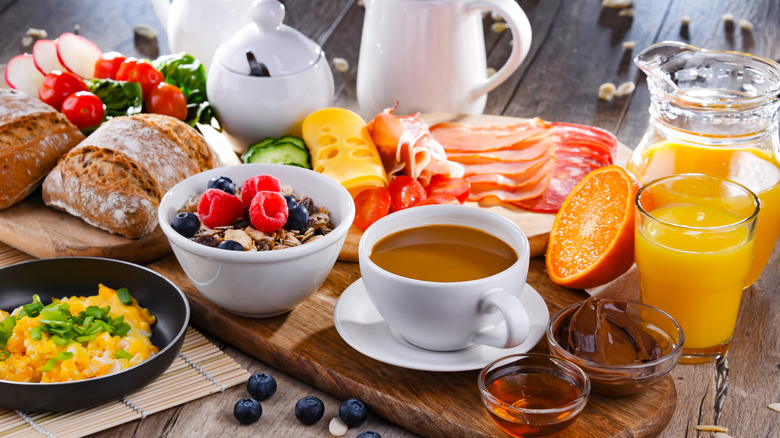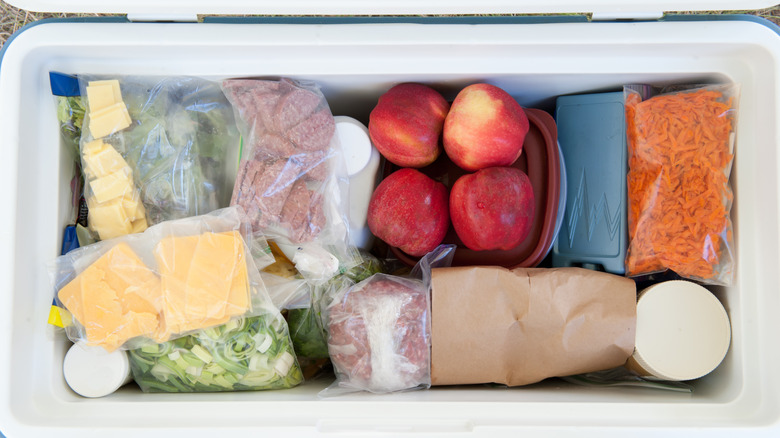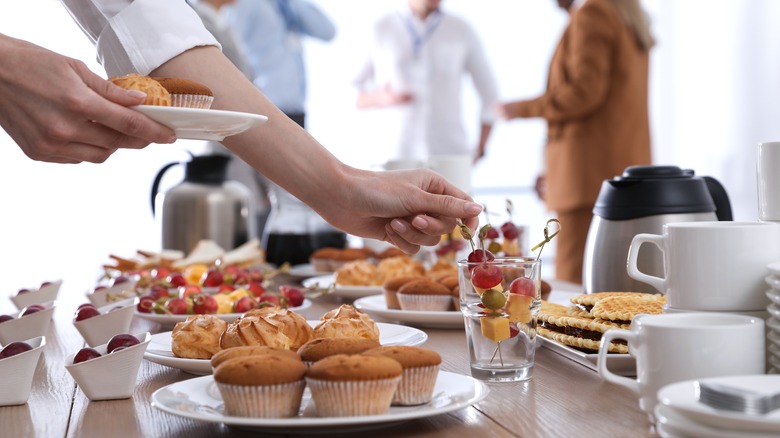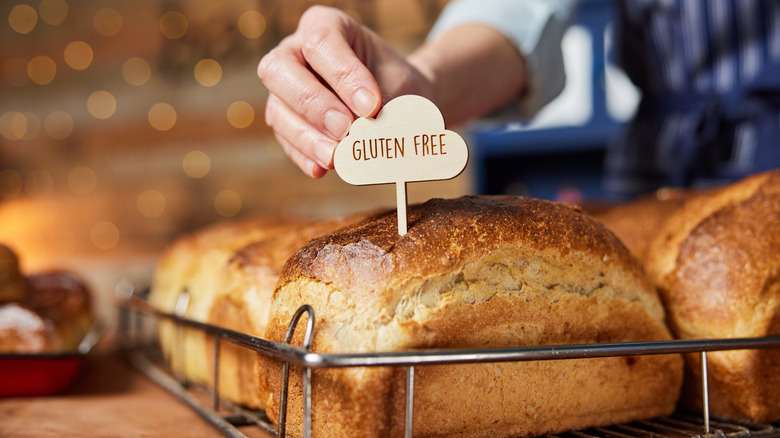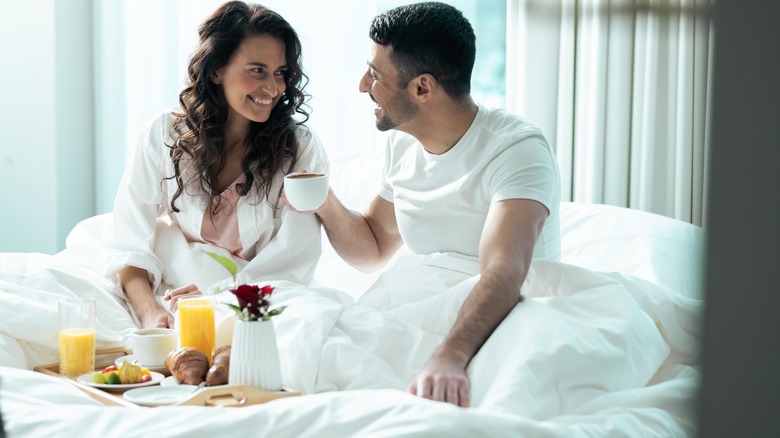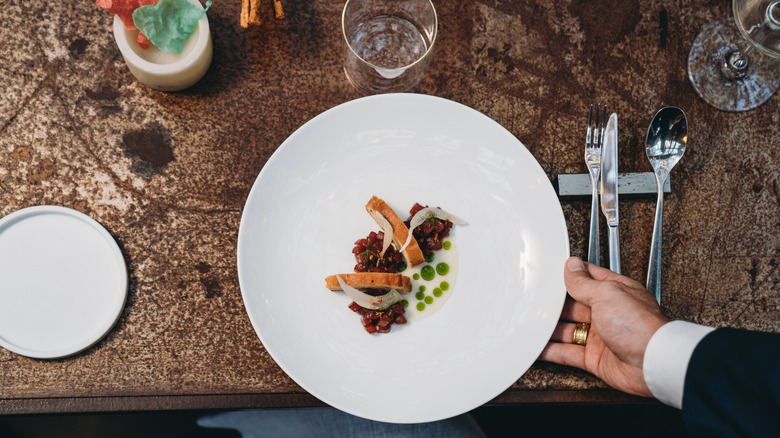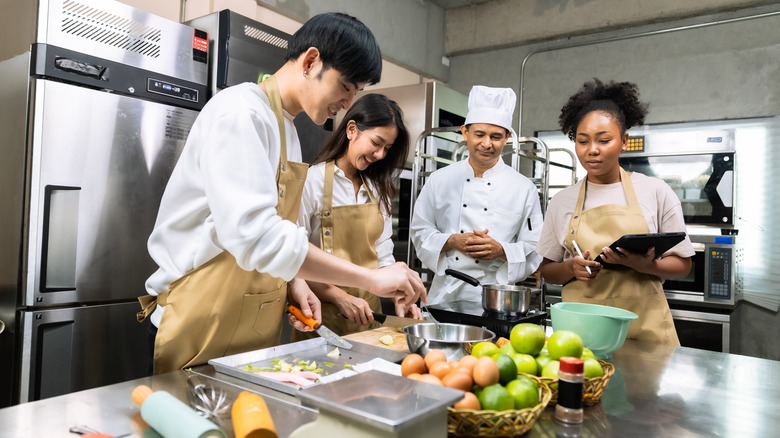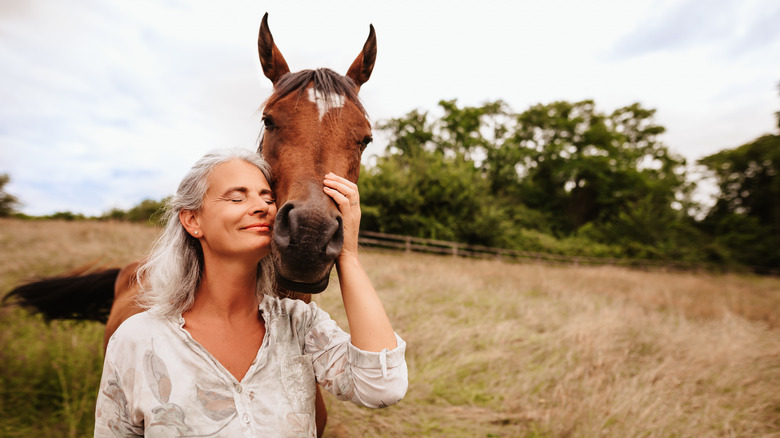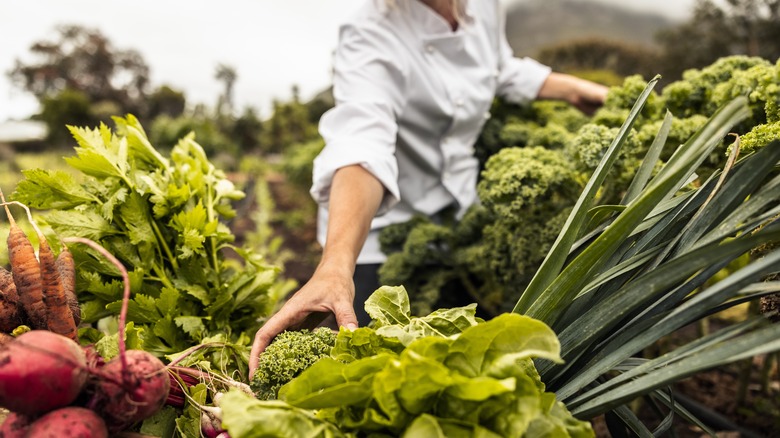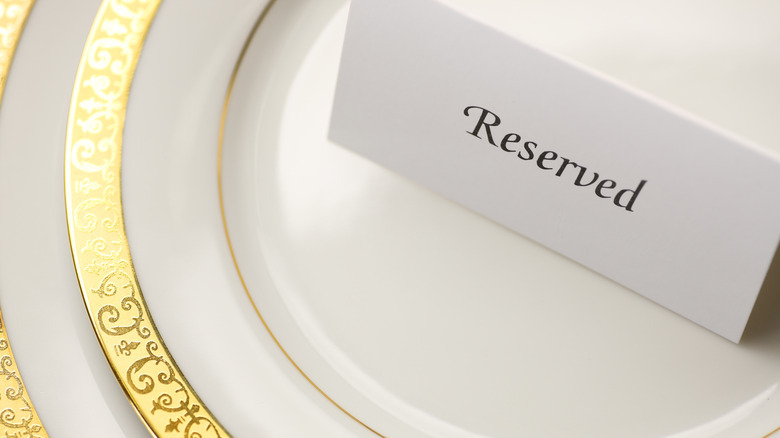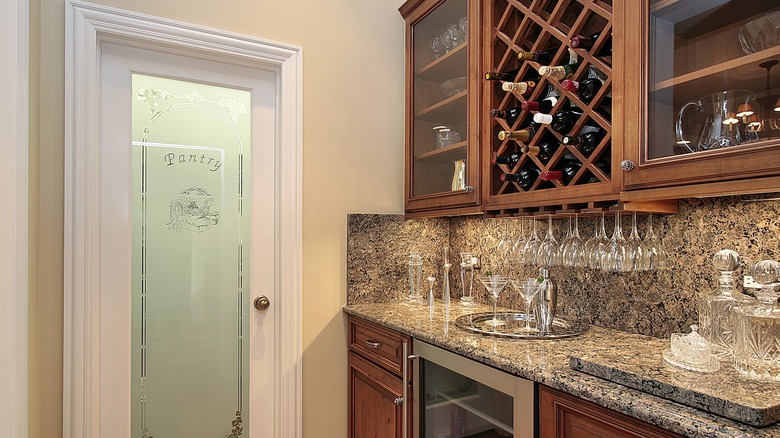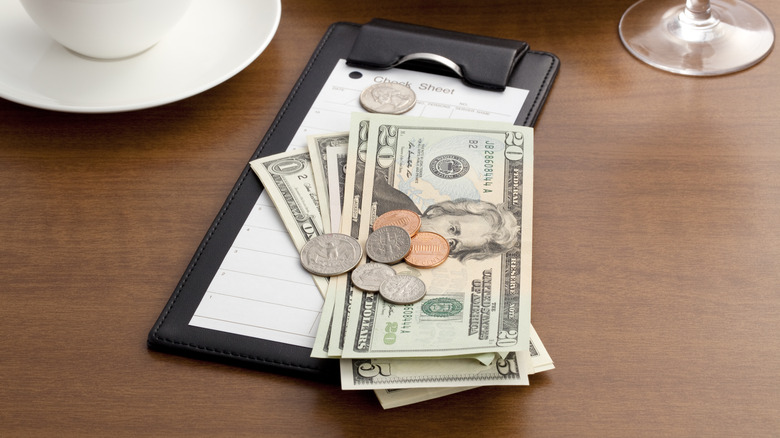The Ultimate Guide To Eating At A Bed And Breakfast
If you haven't stayed at a bed and breakfast, you may think of an old Victorian house that looks a bit outdated with dusty furniture. While there may have been an era where this was somewhat true, B&Bs today are as diverse as the innkeepers who run them. In fact, most B&Bs offer more amenities than some of the finest hotels, with personalized service and, of course, a gourmet, homemade breakfast.
Whatever your interest, there is a B&B to fit your needs. There are spa B&Bs, eco-friendly B&Bs, places for history buffs, and even Bud and Breakfasts, where you can enjoy a doobie in the comfort and privacy of a potting shed. For foodies, the opportunities are even more diverse, as many B&Bs are specifically designed to focus on serving gourmet cuisine prepared by award-winning chefs that rival any fine dining restaurant in any major city.
For those thinking of trying a B&B for the first time, you will want to equip yourself with answers to all your most burning questions to make the stay the absolute best experience possible, particularly where food is concerned. The next time you plan a trip, consider stepping outside the box and booking a stay at a bed and breakfast. Before you go, arm yourself with the information in this guide for making eating at a bed and breakfast the ultimate culinary getaway.
Difference between an Airbnb and a real bed and breakfast
Before getting too wrapped up in details on navigating meals at a bed and breakfast, it might be helpful to understand what a bed and breakfast is not: an Airbnb. Unfortunately, the Airbnb industry has co-opted the term bed and breakfast, making the difference between the two confusing for many customers. This has been incredibly frustrating for innkeepers who are curating spaces different from Airbnbs while simultaneously educating future guests.
At its most basic level, an Airbnb can be a room or home that almost anyone can list for short and long-term stays. Though some modest regulations exist and rudimentary insurance has to be obtained to protect both host and consumer alike, many Airbnb horror stories are out there, illustrating the degree to which these regulations and inspections are somewhat inconsistent across the properties listed. Additionally, though an Airbnb appears to be far more economical, guests are often hit with hidden fees at the end of their stay that quickly render the rental uneconomical.
Individuals with hospitality experience often run bed and breakfasts. They are highly regulated, inspected, and obligated to carry abundant liability insurance. Many B&Bs also have an innkeeper on the premises or nearby that you can contact anytime, day or night, if you encounter a problem or need information. And finally, as the name suggests, breakfast is included in your stay that is prepared and served to you. And perhaps best of all, you don't have to do any dishes.
What kind of breakfast do they serve?
When the word "breakfast" is part of your business name, you better take that part of your operation very seriously — which most B&Bs do. Breakfast can vary from property to property depending on location, local laws regarding food service, the innkeepers, and how many rooms a property has. While some B&Bs have started offering more continental types or to-go breakfast options catering to guest needs, for the most part, B&Bs still serve an elaborate, homemade, hot breakfast.
We have been to more B&Bs than we can count, experiencing every permutation of breakfast possible, from a hearty full English breakfast to a multi-course extravaganza ending with ice cream for dessert. Basics will always include coffee or tea, juice, fruit, meat, like bacon or sausage, and an entrée, which can fluctuate from sweet to savory. These can be offered as a buffet in properties with more than ten rooms or served by the innkeepers tableside in fine china in elegant style. Details regarding what each property does should be clearly indicated on its website. If it is not, we recommend opting for a different B&B.
And finally, breakfast times may vary, with some properties serving at a specific time, others offering flexible times, and even more offering a window during which you can obtain breakfast. Again, this should be indicated on the property website. If you are unsure, do not hesitate to ask. You may also want to consider skipping any B&Bs that fail to advertise their breakfast offerings.
Can you bring your own food and beverages?
Just like in a hotel, you are generally welcome to bring your own snacks or drinks. What may differ from property to property is whether or not eating in your room is encouraged. Many properties have invested in antique furniture and high-end linens. With that in mind, they may be hesitant to allow guests the freedom to dine in rooms to prevent damage to these amenities.
Other properties view your room as your home away from home and encourage you to be as comfortable as possible. This includes furnishing the suite with a refrigerator, coffee machine, wine glasses, snacks, and more. Either way, the key to being a great guest is basic respect. While innkeepers want guests to enjoy themselves, they also care greatly for their property. Many often take pride in the cleanliness and in ensuring each stay is as fabulous as the next one.
For example, if you spill some wine or coffee on the bedspread or carpet, please let the innkeepers know, so they can address the issue immediately. If you notice there are coasters available to protect furniture, use them. And if there are rules outlined requesting you restrict your eating or drinking to a specific area, please do so. These aren't meant to be punitive but to preserve the integrity of the B&B. And finally, clean up after yourself. Even if there are no restrictions on eating or drinking in your room, don't leave trash everywhere.
Do they serve alcohol?
The topic of alcohol will vary from property to property. Many B&Bs provide a cocktail hour to guests in the afternoon with complimentary wine and appetizers. Others have liquor licenses and sell alcohol as an amenity to guests. And some will not do either, opting not to deal with expensive licensing and even more cost-prohibitive liability insurance.
If a property sells alcohol, purchasing what they sell is courteous and helps the property offset insurance costs. That said, most properties operate with an "out of sight, out of mind" mentality. If you bring a bottle of wine or liquor that you are consuming in your room, there will usually not be anyone to penalize you for doing so. Again, it is all about respect. If you drink responsibly, are not damaging property, and are not disturbing other guests, innkeepers recognize that part of enjoying a leisurely getaway can involve sipping on a libation.
And finally, you will find innkeepers to be an amicable lot who often enjoy relaxing at the end of the day with a drink themselves. Though they will always give you the privacy you desire, they are not opposed to sitting out on the porch and chatting over a glass of something. We have spent many enjoyable evenings over a bottle of wine with our innkeepers, learning about local history, getting the scoop on area attractions, and just shooting the bull. If alcohol policies aren't stated on the property website, feel free to ask.
Do you have to eat with others?
The most frequent deterrent for people considering staying at a bed and breakfast versus a hotel or vacation rental is the hesitation around eating breakfast with total strangers. While some properties only have one communal dining room table, these are no longer standard. Many B&Bs have recognized that guests prefer privacy and do not necessarily want to spend their vacation making small talk with strangers, even though some guests thrive off this engagement. It is a personal decision, and innkeepers will do everything they can to accommodate this.
Some B&Bs will stagger breakfast times to facilitate more privacy. Others will offer some options for breakfast in your room, whether it involves breakfast in bed or a private dining room within your suite. Still, others will serve breakfast on the patio, weather permitting. If you aren't sure, ask. Even if a B&B doesn't usually offer private dining, an innkeeper will always accommodate any special request, including one to enjoy a quiet meal in solitude.
A quick note on dining with others. If you do enjoy interacting with other guests, keep the conversation light. People on vacation are not inclined to want to engage in heated discussions. Some of our best experiences have involved discovering that we have mutual friends or went to the same college as other guests. Whatever you do, avoid hot-button topics like religion or politics. These put both other guests and innkeepers in an uncomfortable position of having to walk on eggshells.
What if you have dietary restrictions?
There was a time when if you needed a gluten-free or dairy-free meal, a bed and breakfast could not easily accommodate your request. Those times are long gone. Any bed and breakfast will do what they can within reason to adjust a menu to your specific dietary needs, whether they involve a food allergy or a preference, like vegetarian or vegan. If there is any reason why they cannot accommodate you, they will let you know upfront.
The best rule of thumb is to email, call, or text the property before booking to inquire about its capacity to handle your dietary restrictions. When you book your reservation, be as clear and detailed as possible. Even if you don't think something is important, it may influence the menu the innkeeper plans for your stay. Examples might include you disliking runny eggs, which means an innkeeper won't serve eggs benedict that day. Or, if you prefer savory breakfasts over sweet ones, an innkeeper will avoid making brioche French toast during your stay.
One thing that sets a B&B apart from any other type of lodging is flexibility and the desire to accommodate guests. Personalized attention is what B&Bs do best. For those with special dietary needs, staying at a B&B is ideal. And you never have to feel guilty about asking. Innkeepers take great pride in taking care of their guests. Giving you a healthy, delicious, and safe meal is as important to them as it is to you.
Can you eat in your room?
As we mentioned earlier, whether or not you can eat in your room depends on the place. Every property and every suite is unique. Certain B&Bs are set up with dining accommodations within each suite, either a dining room, a table on a balcony or patio, or some form of eating tray for breakfast-in-bed service. Some properties will have kitchenettes while others have individual cabins with their own kitchens.
This highlights the variability of B&Bs. Again, if you are unsure, ask. Innkeepers should provide a list of rules for the property either on the B&B website or at check-in, informing you of what you can expect, especially where eating or drinking in your suite are concerned. If this is important for you, you may want to inquire with the property before booking to ensure it can accommodate your needs.
And lastly, as we have already noted, even if you are allowed to eat in your room, please do so with respect for the furniture, decor, and facility. Accidents happen, but if and when they do, let the innkeeper know so they aren't caught off guard after you check out when they have less than a couple of hours to clean a room before the next check-in.
Are there other meals served besides breakfast?
While every B&B serves breakfast as part of the room rate, some will offer other meals as part of a package upgrade. This may include offerings such as a romance package with chocolate-covered strawberries and Champagne, a box lunch you can take with you if hiking trails are nearby, and dinner. Some even have full restaurants on the premises where you can book a reservation for lunch or dinner as part of your stay. These will generally be listed on the B&B website, and you are typically required to reserve these before your arrival so that they can prepare accordingly.
From our experience, if a B&B does offer dinners, this is something you might want to seriously consider booking. Culinary-focused B&Bs offer additional meals because they are equipped to do so and specialize in fine dining. This may mean that one of the innkeepers is a professional chef, the property maintains a vegetable garden, or the B&B is located in a destination known for a specific type of cuisine. And dining at your B&B can be incredibly convenient, particularly in more remote locations where there aren't many options for food or the available options are a significant drive from the property.
Always check a property website for information on additional meals and search out these upgrades when you place your reservation. If there are multiple options for each course, you will want to pre-select these. If you have any dietary restrictions, you will want to note them at this time.
What about cooking classes?
Many B&Bs offer cooking classes as part of the amenities. These are as varied as the properties themselves, with some being seasonal, some monthly, some bi-monthly, and others by reservation. Classes can be groups or limited to private parties only. Some last just a few hours, while others last all day, involving trips to the local farmer's market and wine tasting. And then there are those where a chef demonstrates the dishes for you and others that are hands-on, offering you the opportunity to get your hands dirty and create the meal yourself.
Cooking classes often take advantage of local activities, such as B&Bs in Napa focusing on local wine, those in New England being seafood-centric, and those in the South having a Cajun or Creole flair. Still, others hone in on a specialty, typically reflecting the skills or experience of the chef leading the instruction, such as a French or Mediterranean-themed menu. And for the more lengthy programs, the class may include basic instruction in culinary skills, like knife skills or how to filet a fish.
The best part is that you can enjoy the fruits of your labor once the class is over, dining on the dishes you have created. It is truly a complete culinary experience, something distinct to B&Bs. If you love to cook and are a foodie, a cooking class as part of your stay might be just what the doctor ordered.
Is there an opportunity to work on a farm?
If you are a city dweller craving a dose of the farm life, a farm stay bed and breakfast may be just what you were looking for. While every property is unique, several different B&Bs offer permutations of a farm stay. Some are working farms, some are inoperative farms converted to a B&B, and some are strictly B&Bs that may have a few animals on the property.
Within each category, you will find varying degrees of involvement depending on your desire. For example, some may offer you the chance to help with chores or pick vegetables for breakfast. Others allow you to breathe in the fresh country air without having to get too dirty in the process.
What all of them share in common is a commitment to a full country breakfast. If the farm has its own chickens, expect to eat fresh eggs from the farm. If the farm has an apple orchard, apple-cinnamon buttermilk pancakes and homemade apple butter will likely appear. Though there isn't a one-stop shop for locating a farm stay bed and breakfast, all major booking engines will have a filter for this type of stay to help you find what you are looking for. Do keep in mind that depending upon the degree to which you are in a rural area, other area attractions may be limited, as will options for dining outside the farm.
Do they source food from local farms?
If eating farm-fresh food is something you are looking for, plenty of properties are committed to offering farm-to-table or farm-to-fork experiences for guests. Some have farms on the premises, while others source food from local farms. Some may even have an agreement with the farm they get food from to offer tours to guests wanting to see where their food came from. Many of these are the same properties that will offer cooking classes or meals other than breakfast, like lunch or dinner.
You will likely find more of these properties in rural areas unless a B&B can access a farmer's market or an urban farm to source its ingredients. It is all contingent upon state and local licensing, which may restrict some properties from serving eggs or vegetables they have grown on the premises.
A B&B that focuses on providing farm-fresh food will make this a primary aspect of its marketing strategy, so you will not have difficulty locating one. When searching for a property committed to serving farm-to-table food, it may be helpful to search for keywords including "green" or "eco-friendly." These properties will often be listed under these filters to help distinguish them.
Concierge services
While there is certainly no limit to online resources to help you decide what you might want to do while visiting a bed and breakfast, you'd be remiss in not asking the innkeeper for their input as to area activities, particularly if you are hunting for the best places to eat, any local foodie haunts, wine tasting rooms, or pick your own fruit stands.
Innkeepers are experts in the area and will often know about hidden gems that may not have a lot of online presence. They will also generally have a sense of odd hours of operation or when something might be closed to help you plan your stay accordingly. Another perk to asking your innkeeper for advice is that some properties will have standing agreements with area restaurants that offer guests of their B&Bs a free appetizer, dessert, or preferential seating.
While innkeepers may not be able to make a reservation for you, depending upon the area and the innkeeper, some might. It never hurts to ask. Remember, personalized service is what a bed and breakfast does best. When you opt to stay at a bed and breakfast, you should not forget to take advantage of this service. It will save you hours on the computer and ensure you have the best possible getaway.
Can you use the kitchen?
Access to the kitchen may or may not be limited at a B&B. Some properties will provide a designated area where guests can access basic kitchen supplies, a sink, a coffee maker, a tea kettle, snacks, bottled water, and more. Others may offer some access to the kitchen during off hours as long as they are not serving meals other than breakfast. And then there are those where each suite has a small kitchenette.
Even those properties that prefer you not to use the kitchen will make accommodations in certain circumstances, for example, if you need access to the refrigerator for medication or to store food you purchased at a local farm. They may also allow you access if you have a specific dietary restriction that makes dining out inconvenient. For example, if you are vegan and need to set up a crock pot that isn't intrusive, they may offer you a countertop to use in the kitchen.
If you are unsure, ask. But never assume that you have free reign at a bed and breakfast. Part of the perk of getting a full gourmet breakfast is that an innkeeper has to work in the kitchen uninterrupted. There may also be health code restrictions dictated by state and local laws that make the kitchen only accessible to those who have undergone food safety handling training. And if you are allowed to use the kitchen, be courteous. This includes doing your own dishes, putting things away, and not snooping in cabinets marked private.
Do you have to tip?
The short answer to whether you have to tip at a bed and breakfast is — no. Most inns are run by owner-operator innkeepers who may or may not have an outside cleaning or food service staff. Though the services provided by the innkeeper are included in the room rate, tips are intended to show gratitude for the hospitality you have received at a food service or lodging establishment.
Therefore, if you appreciated the work the innkeepers put into making your stay memorable, safe, and delicious, you might consider leaving a cash gratuity in the suite or adding a tip to the credit card charge upon checkout. If there is staff, it is always encouraged to tip, just as you would for housekeeping in a hotel or a waiter in a restaurant. Additional ways of thanking your innkeepers include sending a thank you note or leaving a review online and on the property's social media pages.
These reviews are more helpful than you might realize. Most consumers will consult reviews before making a final decision about whether or not to stay at a property. If two B&Bs have identical amenities, your favorable review highlighting the stellar service and food may be just the thing to push that person over the edge and book their stay. We know that getting solicitations for reviews from every business can get frustrating and that writing these reviews can be tedious. Unfortunately, they are a part of doing business in this world that a bed and breakfast relies upon.
